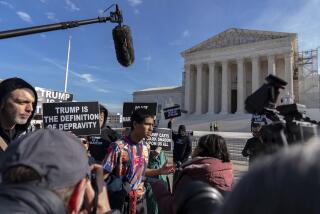Supreme Court: A victory for citizens interested in good government
By a unanimous vote, the Supreme Court ruled Monday against a Nevada public official who argued that a legislator’s vote is a form of speech protected by the 1st Amendment. The decision is good news for citizens who want their elected representatives to be held to high standards of integrity.
Michael A. Carrigan was censured by the Nevada ethics commission for voting as a Sparks city councilman on a hotel/casino project that hired a close friend and former campaign manager as a public relations consultant. Nevada’s ethics law requires local and state legislators to recuse themselves from matters involving relatives, employers, business partners or anyone with whom the legislator has a relationship “substantially similar” to such ties.
Carrigan challenged his censure, arguing, among other things, that his vote was constitutionally protected speech, not action, and therefore couldn’t be regulated. Writing for the court, Justice Antonin Scalia rejected that contention. “[A] legislator’s vote is the commitment of his apportioned share of the legislature’s power to the passage or defeat of a particular proposal,” he wrote. “The legislative power thus committed is not personal to the legislator but belongs to the people; the legislator has no personal right to it.”
Scalia also surveyed American history to show that laws requiring legislators to avoid conflicts of interest had not been struck down on 1st Amendment grounds or otherwise. “The Nevada Supreme Court and Carrigan have not cited a single decision invalidating a generally applicable conflict-of-interest recusal rule — and such rules have been commonplace for over 200 years,” he wrote.
Monday’s decision didn’t address two other claims by Carrigan: that the language of the ethics law unconstitutionally restricts the right of politicians and supporters to associate with one another, and that a key provision is unconstitutionally vague. In a concurring opinion, Justice Anthony M. Kennedy suggested that Nevada’s ethics law might impinge on the 1st Amendment speech rights of legislators and their constituents “apart from an asserted right to engage in the casting of a vote. (Justice Samuel A. Alito Jr., though he joined in the majority, wrote separately to dispute the idea that a vote isn’t a form of speech.)
What matters about the decision, however, is the court’s rejection of the view that an action — casting a vote — is a form of speech. A contrary outcome would have hobbled the enforcement of conflict-of-interest regulations across the country. Whether they are pressing their own position in a vote or deferring to constituents, legislators are engaging in an action for which they must be held accountable.
More to Read
A cure for the common opinion
Get thought-provoking perspectives with our weekly newsletter.
You may occasionally receive promotional content from the Los Angeles Times.






